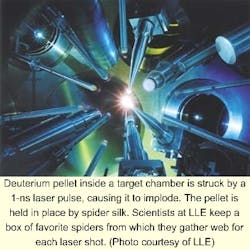
The potential success of inertial-confinement fusion (ICF) is closely tied to how evenly a small spherical object can be illuminated: the more uniform the irradiated optical energy can be made across the millimeter-sized deuterium or deuterium/tritium target pellet, the more uniformly the pellet implodes. A spherically symmetric implosion creates the highest matter densities and thus the highest fusion yield (see figure). Researchers at the Laboratory for Laser Energetics (LLE; Rochester, NY) have performed the first full-scale test of polarization smoothing with birefringent wedges, reducing nonuniformities across the pellet. With its 60-beam pulsed Omega laser, LLE is an ideal location for this sort of research.
On its way to the pellet, each beam passes through a distributed phase plate, which introduces a fine random phase variation into the beam. A standard part of an ICF setup, the phase plate reduces large-scale nonuniformities; however, small-scale nonuniformities make their appearance on the target in the form of laser speckle. The modulation of such a speckle pattern can reach 100% and can significantly reduce fusion yield. In polarization smoothing, the laser beam is separated into two orthogonal polarizations, which are then combined at slightly different angular directions on the phase plate, reducing the spatial coherence of the light and increasing uniformity.
Polarization smoothing works best when combined with another technique called smoothing by spectral dispersion (SSD). A high-frequency electro-optic phase modulator produces a wavelength modulation that is converted by a diffraction grating into an angular beam displacement; the result is a rapidly shifting spectral pattern. Because the laser pulses are only 1 ns in duration, the modulation frequency must be high. In their demonstration of polarization smoothing, the researchers worked with an SSD frequency boosted from 0.35 to 1 THz.
With polarization smoothing and 1-THz SSD in place, the test resulted in a deuterium yield of 1.6 x 1011 neutrons, as compared to 6 x 1010 neutrons for no polarization smoothing and 0.35-THz SSD. "As we fine-tune the system, we should be able to get even more than a 70% increase in neutron yield," says David Meyerhofer, a professor of mechanical engineering at the University of Rochester. Combining polarization smoothing with cooling the target spheres to below 32 K should further improve the fusion yield.
About the Author
John Wallace
Senior Technical Editor (1998-2022)
John Wallace was with Laser Focus World for nearly 25 years, retiring in late June 2022. He obtained a bachelor's degree in mechanical engineering and physics at Rutgers University and a master's in optical engineering at the University of Rochester. Before becoming an editor, John worked as an engineer at RCA, Exxon, Eastman Kodak, and GCA Corporation.
